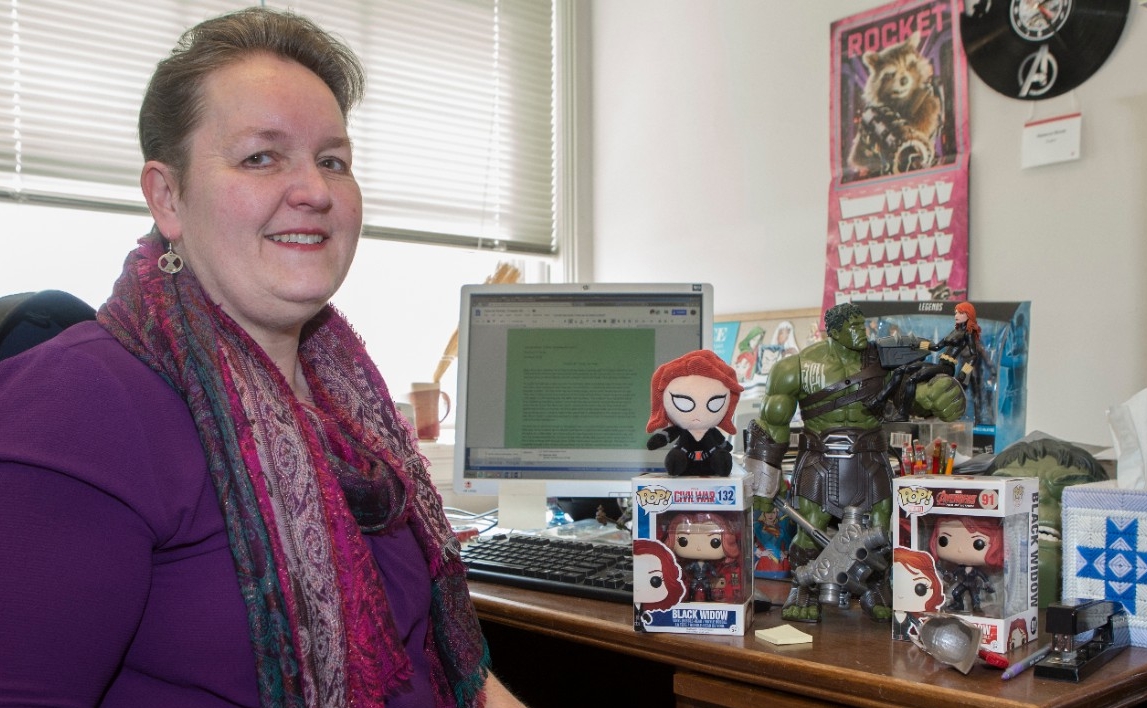UC English professor Rebecca Borah poses with her office collection of Marvel memorabilia.
Marvel's Black Widow problem
Marvel Studios still has no stand-alone Black Widow movie. UC pop culture expert Rebecca Borah said the blockbuster superhero franchise should make room for the Russian superspy.
By Michael Miller
513-556-6757
Photos by Joseph Fuqua II/UC Creative Services
April 13, 2018
Pop culture critic Rebecca Borah was in the theater cheering when Tony Stark welded together his first Iron Man suit and T’Challa fought for the future of Wakanda.
In between, the University of Cincinnati English professor has followed the lives and times of Steve Rogers, Bruce Banner and a parade of other male heroes in the Marvel Cinematic Universe, most of whom are advised, encouraged or saved by one of the original Avengers, Natasha Romanoff or Black Widow.
“How Natasha is handled is important because she is the first female Avenger,” Borah said. ”She’s the one who has been around the longest in the films. Marvel is getting better at diverse representation, but at the same time they haven’t done this character justice in a lot of ways. She hasn’t gotten the same recognition of having her own solo movie.”
Borah, an associate professor of English and comparative literature in UC’s McMicken College of Arts and Sciences, addressed this omission and the reasons why the character inspires such fan loyalty in an April presentation to the national Popular Culture Association conference in Indianapolis.
Borah’s paper, titled “Red in Everyone’s Ledger: Marvel’s Black Widow Difficulties,” chronicles the character’s story arc as portrayed on screen by actress Scarlett Johansson. The former Russian spy in the films is one of the founding members of the Avengers, a group of superheroes fighting for justice against tyranny and terrorism as they grapple with the complications created by abilities that place them beyond the reach of the law.
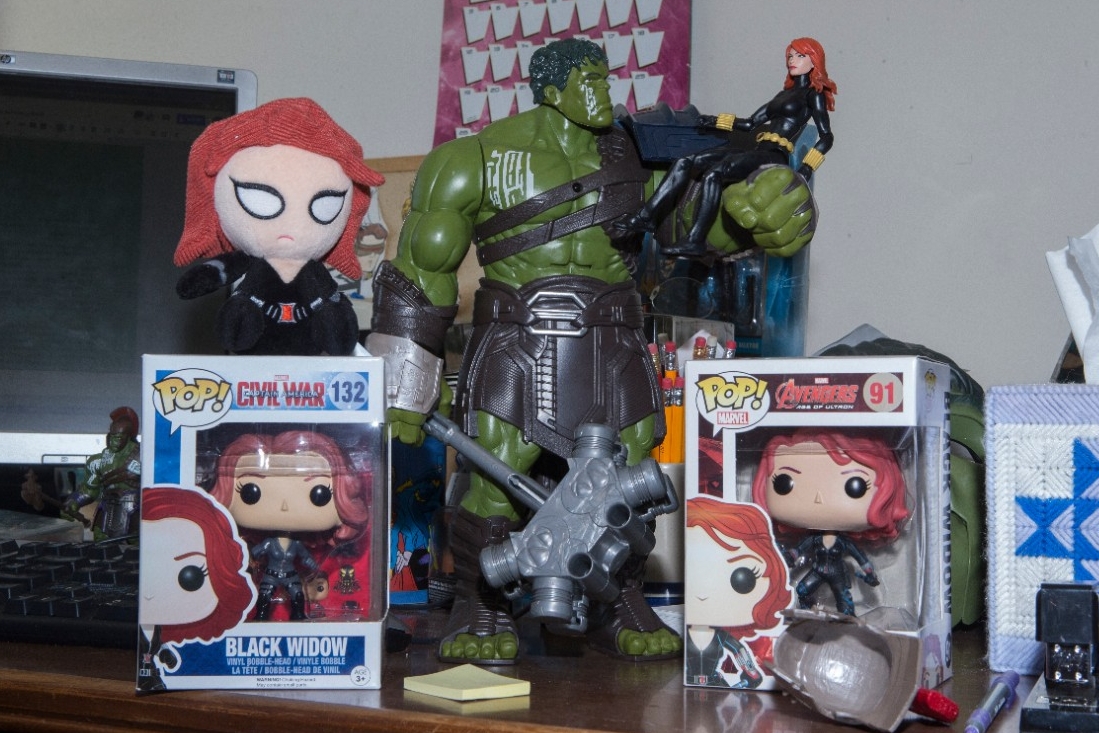
UC English professor Rebecca Borah keeps a collection of Marvel memorabilia in her office.
Black Widow is a Marvel favorite, appearing in at least six films because she appeals to a diverse audience ranging from feminists to fanboys, Borah said. But Marvel Studios hasn’t given the character a chance to carry her own film.
It’s a sore point with Marvel watchers as the studio rolls out “Avengers: Infinity War” on April 27.
“If ‘Wonder Woman’ star Gal Gadot, Charlize Theron’s Furiosa in ‘Mad Max: Fury Road’ and Daisy Ridley’s Rey in ‘Star Wars’ haven’t convinced Marvel Studios that fans really, really want to see women leading action movies more than once in a blue moon, what will?” asked writer Laura Bradley in Vanity Fair.
Marissa Cortes with ComicsVerse said a stand-alone Black Widow movie would be “a great chance to establish Natasha Romanoff in the Marvel Comics universe beyond her relationships with other male characters.”
One Marvel fan site tweeted an April Fools’ Day announcement about a stand-alone Hawkeye movie that generated a strong reaction.
“Hawkeye before Black Widow? Naaah!” one fan replied.
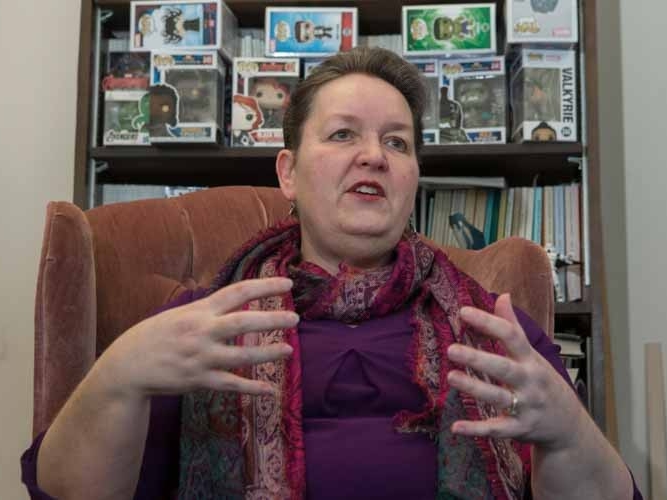
Rebecca Borah
“It’s gods and monsters. Comic books have always been a kind of modern mythology, a way of making sense of bigger issues in the world.”
‒ Rebecca Borah, UC English professor
UC’s Borah said she is eager to see a Black Widow origin movie, perhaps one framed in the present with a new looming crisis to advance Marvel’s overarching storyline.
“I like Natasha because she’s a deep enough character that she has both the kick-ass ability to take people down and to analyze a problem and really understand,” Borah said. “She does it by working hard, doing a lot of research and reading people very well. She’s gone beyond what it takes to be a spy. She is now a team leader.”
Borah is an expert in both Marvel’s movies and its comic book canon. Her office in McMicken Hall is a pop culture delight of movie posters, action figures and superhero memorabilia.
Superhero movies largely have been boys’ clubs. The entertainment blog Twizzle found that just half of the Marvel and DC superhero movies pass the measure of sexism and gender bias called the Bechdel-Wallace test that examines whether a movie has at least two named major female characters talk to each other about a topic other than another male character.
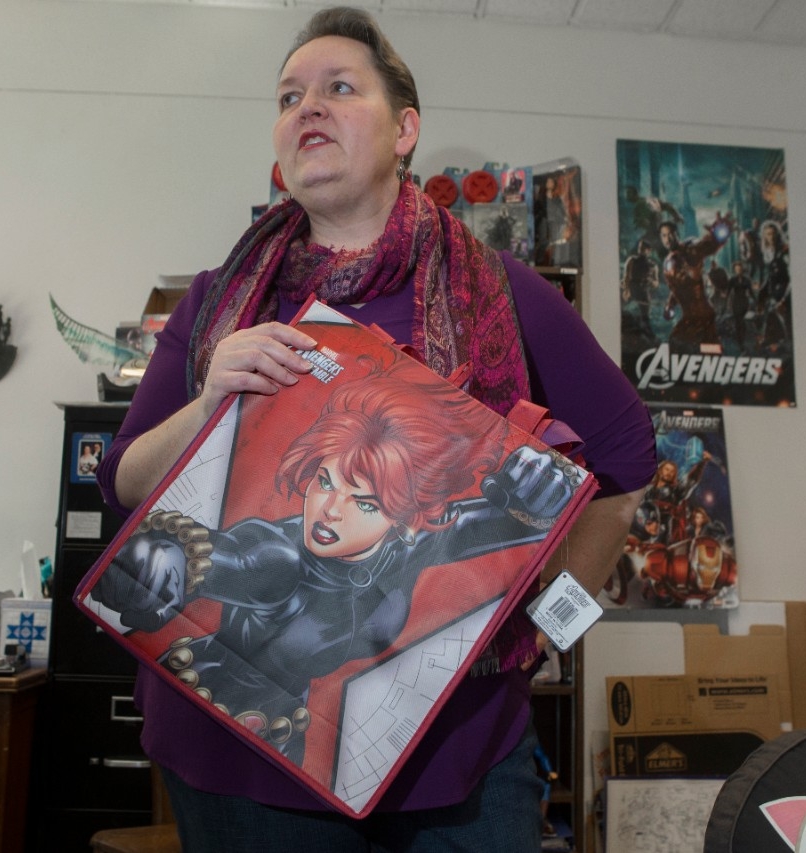
UC pop culture expert Rebecca Borah holds up a Black Widow tote bag in her office in McMicken Hall. Borah said Black Widow is the most controversial character in the Marvel Cinematic Universe.
Borah said Black Widow often serves as a foil and confidant of male characters in the films. Her rich comic book backstory (Stan Lee introduced her in 1964) made her friend, foe or both to a diverse cast, ranging from Tony Stark to Spider-Man to Daredevil.
“When the second Avengers film came out, a lot of people griped about Natasha: that she had been ‘damseled,’ that she had been disempowered, that somehow having a love interest was taking something away from her,” Borah said.
Some fans disapproved of the budding relationship between Romanoff and the Hulk's Bruce Banner, Borah said.
“If you go back and look at the first film, there is chemistry there between Natasha and Bruce,” she said. “But a lot of people dismissed it because (Hawkeye’s) Clint Barton and Natasha were together in the comics. Then in ‘Captain America: Winter Soldier,’ Natasha was flirting with Cap. All the ‘Romanogers’ people [fans rooting for a Romanoff-Rogers pairing] got on their horses with that thread, and it took off.”
These interpersonal dynamics are secondary to what makes Black Widow a compelling character and a strong story protagonist, Borah said. But the professor admits she is not above her own wish fulfillment fantasies. (She writes fan fiction.)
“You get some hints of that chemistry when Agent Romanoff verbally spars with Banner to convince him to work with S.H.I.E.L.D. When she’s talking with Clint in the infirmary about the new ‘red in her ledger,’ she is talking about Bruce and how she couldn’t protect him from Hulking out,” Borah said.
Summer popcorn movies about people in colorful body armor could be dismissed as culturally irrelevant. But Marvel’s first 18 movies combined have earned nearly $15 billion in worldwide ticket sales, according to Forbes. The studio has plans to launch at least 14 more films in the next few years. This year’s “Black Panther” broke Marvel and domestic box office records alike, topping $1.2 billion worldwide to become one of the top grossing films of all time.
Because they reach such a wide audience, Marvel’s films serve as a cultural touchstone to millions of people, Borah said.
In much the same way film critics have compared “Star Wars: A New Hope” to the hero’s journey in Homer’s “The Odyssey,” Marvel movies touch on bigger themes such as family, duty and honor. As strong as each hero is individually, the Avengers prevail only by working together. And Borah said Natasha Romanoff often provides the glue.
“It’s gods and monsters. Comic books have always been a kind of modern mythology, a way of making sense of bigger issues in the world. That’s why Black Panther resonates so strongly with moviegoers,” she said. “How can you be a strong ruler and a good person, too? Sometimes it’s hard to walk those two paths.”
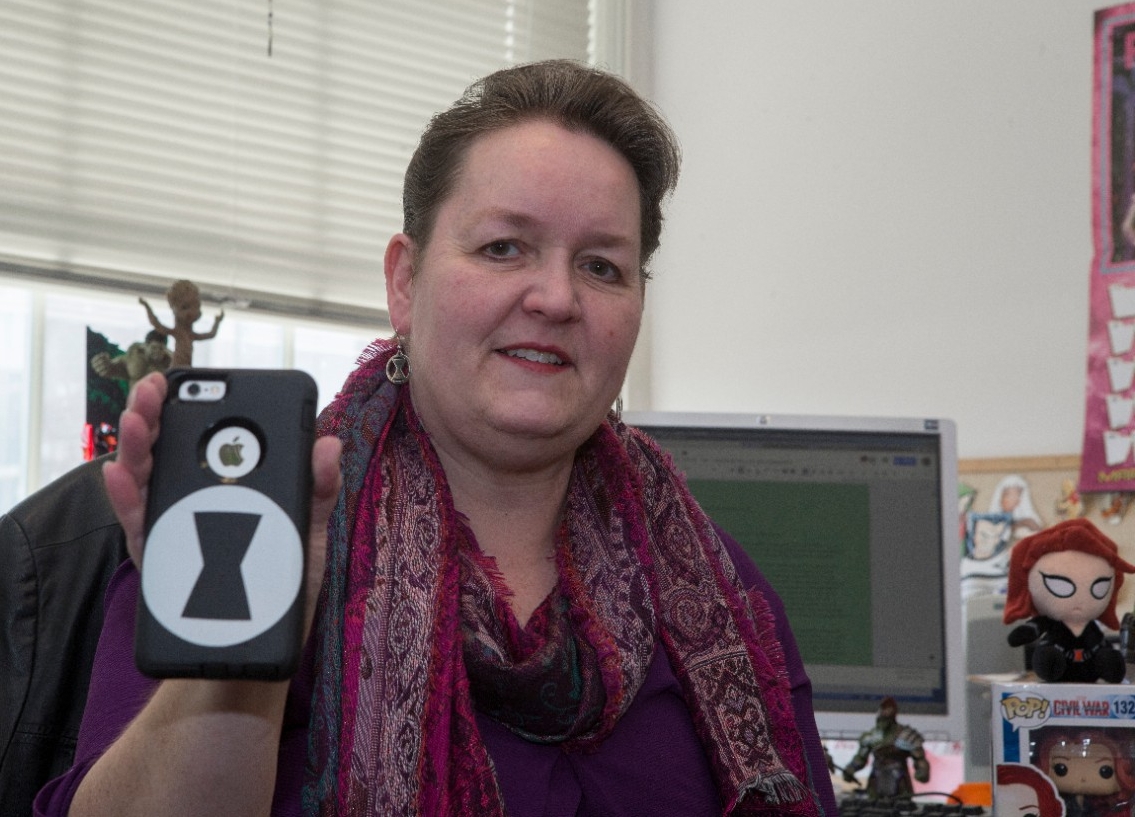
UC English professor Rebecca Borah holds up her Black Widow-themed iPhone case.
Marvel has largely eclipsed the serious and brooding DC Comics superheroes despite many fans’ preference for DC’s villains. Borah said Marvel movies have more humor and range than their DC counterparts. And Marvel has given independent film directors such as James Gunn and Taika Waititi the chance to let their unique styles come across in each movie, Borah said.
“This willingness to experiment within a proven formula and push boundaries and expectations has kept Marvel Studios moving forward without losing momentum,” she said.
Ultimately, Borah thinks Marvel has done a good job introducing Black Widow to a mass audience.
“Why is it that so many people think Marvel has mishandled Black Widow? I don’t think there was any great way to ‘right-handle’ it,” she said. “The fact that you have canon in the comic books diverging with canon in the films really tears some people up.”
But insisting on a predominantly white and male cast has led to some complications, Borah said.
“Because Natasha was the only female Avenger for several films, she became the lightning rod for channeling fans’ hopes and desires for a female superhero and all that entails,” Borah said. “Natasha Romanoff has to become all things to all creators and all audiences, which is a completely unwinnable and unsatisfactory situation for everyone.”
Borah said this dissatisfaction is apparent in the torrent of online criticism on fan sites and social media. Ideally, the franchise would have introduced female characters such as Wasp, Captain Marvel or Monica Rambeau sooner. But that would have required major changes in the Marvel Cinematic Universe they created, she said.
“That’s not very likely when Marvel executives were insisting that diversity and inclusion were unnecessary because they thought no one would buy female or non-white action figures, much less go see the characters on the big screen,” Borah said.
The monumental success of this year’s “Black Panther,” which features a diverse, A-list cast and no fewer than five prominent female characters, should put those unfounded fears to rest in future projects, she said.
“Fortunately, as the studio has evolved, so have corporate attitudes as gamble after gamble on diversity and inclusion has paid off,” Borah said. “The time is right to include a Black Widow solo film on the schedule at last so Natasha will finally get a chance to shine as the focus of her own story in her own right.”
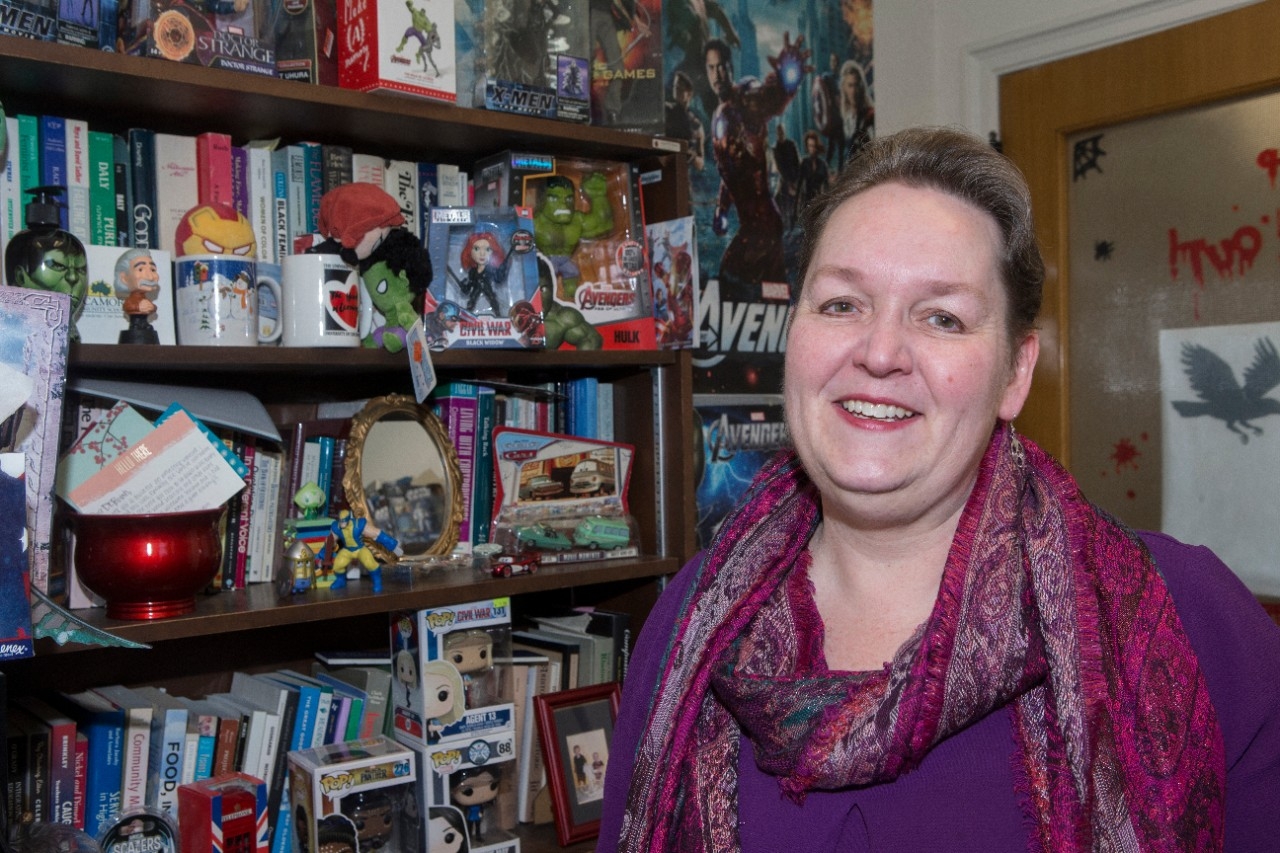
UC English professor Rebecca Borah said future superhero movies will be more inclusive, thanks in part to the financial success of "Black Panther."
Global audience
UC professors and students present their ideas and research at conferences all over the world. Check out the Department of English and Comparative Literature in UC's McMicken College of Arts and Sciences or explore other programs on the graduate or undergraduate level.

